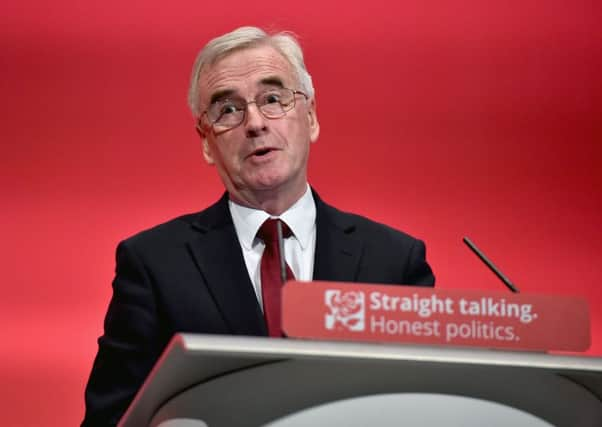Leader: Thatcher jibe an own goal for McDonnell


During a visit to Edinburgh this weekend, shadow chancellor John McDonnell compared First Minister Nicola Sturgeon to former Tory Prime Minister Margaret Thatcher, a figure still much reviled in Scotland more than a quarter of a century after she was forced out of office.
It’s a comparison few – even among Labour supporters – will think at all fair.
Advertisement
Hide AdAdvertisement
Hide AdMcDonnell said Sturgeon was taking Scotland back to the 1980s with cuts to public services.
The shadow chancellor’s experience of the “Thatcher years” is very different to that of Scots. When the former Conservative leader was in Downing Street, McDonnell was chair of finance and deputy leader of the Greater London Council (GLC), then led by Ken Livingstone.
Both McDonnell and Livingstone were locked in an ideological battle with Thatcher which ended with her government abolishing the GLC after a series of bitter battles over funding for public services.
Undoubtedly, McDonnell’s anger at the actions of the later former prime minister is real. But his attack on Sturgeon betrays a lack of understanding of Scottish politics.
The First Minister was, in her own way, as much of an opponent of Thatcher as McDonnell was. Sturgeon has spoken at length about her own political awakening in the 1980s, explaining that she was motivated by the actions of Thatcher’s government.
Sturgeon’s is a story that chimes with a great many Scots, and McDonnell’s comparison between her and Thatcher doesn’t ring true.
We wonder if the shadow chancellor fully grasps Scotland’s relationship with Thatcher. For those of us living north of the border, her government didn’t mean dramatic fights with radical – and egotistical – councillors, it meant the accelerated closure of manufacturing industries without thought given to replacements. It meant bitter industrial disputes that affected many thousands of families.
Thatcher’s legacy in Scotland is an enduring antipathy by the vast majority towards the Tory party. And that antipathy is a key driver of the SNP’s roaring success.
Advertisement
Hide AdAdvertisement
Hide AdThose who lived through the 1980s know that Nicola Sturgeon is no Margaret Thatcher.
Regardless of what one thinks of her politics, Sturgeon is one of the most popular politicians Scotland has ever seen. Crowds flock to see the First Minister speak at rallies; the only crowds that came to see Thatcher when she crossed the border were there to protest, not to listen.
McDonnell – no novice when it comes to making errors of judgment – has made a mistake which the SNP can now capitalise upon.
He was right, of course, to highlight council finances, where the SNP has a problem, and he has given Scottish Labour leader Kezia Dugdale the backing she deserves from the party leadership.
But there’s every chance that more people will be offended by his comparison with Thatcher than converted by it. We are bound to say that we cannot imagine Dugdale comparing Sturgeon to Thatcher. For one thing, she has previously spoken of her admiration of the First Minister’s political talent and, for another, she knows how hysterical, personal attacks on the SNP have a knack of playing badly for Labour.
The Tories that McDonnell cast as the enemy are still here, and breathing down Labour’s neck. Polls suggest that Ruth Davidson’s Scottish Conservatives may even force Dugdale’s party into third place in May’s Holyrood election.
If this clumsy attack on the First Minister is the best John McDonnell can offer, he might be best to take a vow of silence on the matter and let Kezia Dugdale get on with the already daunting task of resurrecting Labour’s fortunes in Scotland.